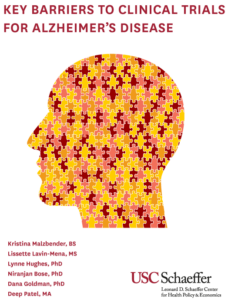Alzheimer’s disease is rapidly overwhelming seniors, their families and the healthcare system, yet no new treatments have entered the global market in more than 15 years. Randomized clinical trials—a cornerstone of the drug-development process—present particular challenges to developing Alzheimer’s therapies.
 To better understand these hurdles and develop a strategy for surmounting them, researchers surveyed nearly 900 Alzheimer’s disease stakeholders, including clinical trial personnel, patients, caregivers and physicians. They identified several broad challenges in a new USC Schaeffer Center white paper, including limited physician and patient awareness of clinical trials and the early stages of Alzheimer’s, fear of diagnosis, overstretched healthcare systems, lack of effective treatment options and a shortage of fast yet inexpensive diagnostics.
To better understand these hurdles and develop a strategy for surmounting them, researchers surveyed nearly 900 Alzheimer’s disease stakeholders, including clinical trial personnel, patients, caregivers and physicians. They identified several broad challenges in a new USC Schaeffer Center white paper, including limited physician and patient awareness of clinical trials and the early stages of Alzheimer’s, fear of diagnosis, overstretched healthcare systems, lack of effective treatment options and a shortage of fast yet inexpensive diagnostics.
High Cost and Lack of Awareness Are Key Obstacles
Alzheimer’s trials cost more per patient than trials in many other therapeutic areas. Screening accounts for 50–70% of the total per-patient expense, as failures at each step of the process mean more tests for more patients—and higher costs for trial sponsors.
“Alzheimer’s disease will impose a significant burden on society in the coming decades,” says USC Schaeffer Center Director Dana P. Goldman. “It’s imperative we identify ways to accelerate the clinical pipeline to change the trajectory.” Goldman is also interim dean of the Price School of Public Policy and Distinguished Professor of Public Policy, Pharmacy and Economics at USC.
The disease’s characteristic degeneration of brain cells can be observed using magnetic resonance imaging and computed tomography scans, while biomarkers like amyloid-beta plaques can be detected using positron emission tomography or analysis of cerebrospinal fluid. However, these tests are costly, wait times can be on the order of several months and failure to detect the disease in mild cases is common—with a screen failure rate of up to 88%.
In total, approximately 99% of potential participants either do not consider or are never referred to a clinical trial. New approaches to Alzheimer’s trials must therefore understand and address the reasons why if they are to succeed bringing as many people as possible into the clinical-trial ecosystem.
In a corresponding blog post, Paul Aisen, Jessica Langbaum, and Julie Zissimopoulos write about improving participation in Alzheimer’s clinical trials. They write that innovations to funnel people toward Alzheimer’s clinical trials would start by increasing awareness of the disease—especially its early stages—among the public, then equipping healthcare providers and researchers with effective and efficient biomarkers and cognitive-assessment tools, and facilitate participant awareness of, referral to and retention in clinical trials.
Alzheimer’s clinical trials also lack diversity in representation of participants from varied ethnicities, sexual and gender identities, or educational backgrounds. New approaches and collaborations are needed to remove barriers to minority recruitment.
In addition, the COVID-19 pandemic has affected clinical trials around the world, including Alzheimer’s trials, creating a new set of challenges including adapting cognitive tests and remote blood collection. But the pandemic is also accelerating the digital transformation of clinical trials, including for Alzheimer’s, and providing an opportunity to implement simpler protocols and approaches for digital engagement.
While these evolutions may bring innovation to clinical trials, the key to success is robust collaboration across the Alzheimer’s research community. Patient organizations, healthcare providers, researchers, government and industry must work together in a holistic approach to reforming the process of clinical trials for Alzheimer’s disease.
The USC Schaeffer Center, supported by Gates Ventures, is aiming to address the barriers identified in white paper by bringing together diverse panels of experts in a series of workshops. Through these workshops and publications, stakeholder groups will identify ways to overcome clinical trial barriers and ultimately to accelerate development of treatments for Alzheimer’s disease.

You must be logged in to post a comment.